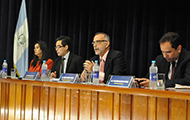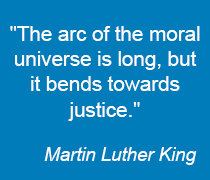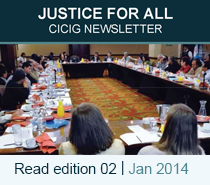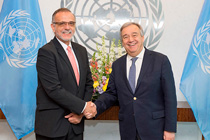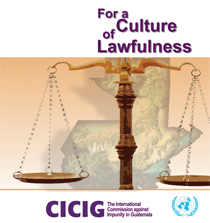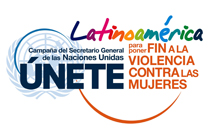PRESS RELEASE 010
EUROPEAN UNION CONTRIBUTES TO INTENSIFYING THE FIGHT AGAINST IMPUNITY
 Guatemala, February 20, 2014. The European Union and the United Nations in Guatemala signed a cooperation agreement worth 4 million euros (GTQ 44 million) to support the work of CICIG in Guatemala. The donation was made in the framework of EU cooperation policies on conflict prevention, peace, security and competitiveness.
Guatemala, February 20, 2014. The European Union and the United Nations in Guatemala signed a cooperation agreement worth 4 million euros (GTQ 44 million) to support the work of CICIG in Guatemala. The donation was made in the framework of EU cooperation policies on conflict prevention, peace, security and competitiveness.
The announcement of the support was made at a press conference attended by the Ambassador of the European Union to Guatemala, Stella Zervoudaki, the United Nations Resident Coordinator in Guatemala, Valerie Julliand, the Attorney General of the Republic and Head of the Public Prosecutor's Office (MP), Claudia Paz y Paz, the Minister of the Interior, Mauricio López Bonilla, a representative of the Judiciary (OJ), Judge Mynor Custodio Franco Flores, and Commissioner Iván Velásquez Gómez. Members of the diplomatic corps in Guatemala were also invited to attend.
In her address, Ambassador Zervoudaki stressed that according to figures of the Public Prosecutor's Office (MP), Guatemala still suffered a high level of impunity, of around 70%, affecting the quality of life of Guatemalans and the image of the country—a serious impediment for national and foreign investment.
"The European Union recognises the need to continue and intensify the fight against impunity. In fact, the respect for and compliance with the law, both nationally and internationally, are the base of its cooperation. That is precisely why the European Union and its Member States have supported CICIG, both on a political and financial level, since the beginning of its mandate in September 2007," she said.
The Ambassador valued the current priorities of the Commission, such as the criminal investigations it is undertaking in close collaboration with the Public Prosecutor's Office and the Ministry of the Interior. "The selection of strategic investigations will be a clear means of transferring skills and consolidating sustainable institutions," she said.
She said that in order to work efficiently CICIG needed reliable institutional partners, such as the MP. "This institution, under the leadership of Attorney General Claudia Paz y Paz has achieved remarkable results. If we look beyond the statistics, there has been important structural progress. Examples of this progress include the Analysis Unit, efforts to broaden the geographic scope of prosecution offices, the new, strategic criminal investigation method, the creation of new, special prosecution offices for issues such as asset laundering, and special investigation methods."
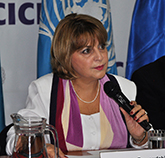 The Ambassador also referred to the national importance of the election procedures to select officials for the Supreme Electoral Tribunal, the Supreme Court of Justice, the Court of Appeals, the Public Prosecutor's Office (MP) and the Comptroller General's Office. These election procedures are a unique opportunity for the State of Guatemala to consolidate important progress in the area of justice and security.
The Ambassador also referred to the national importance of the election procedures to select officials for the Supreme Electoral Tribunal, the Supreme Court of Justice, the Court of Appeals, the Public Prosecutor's Office (MP) and the Comptroller General's Office. These election procedures are a unique opportunity for the State of Guatemala to consolidate important progress in the area of justice and security.
She also said that CICIG and the European Union, along with other partner countries of Guatemala, respectfully supported the work of the State of Guatemala.
Support
The United Nations Resident Coordinator in Guatemala, Valerie Julliand, said that the UN always assisted in procedures to seek justice—the core of its mandate to foster dignified human development.
"The United Nations supports and values the work of CICIG, the efforts undertaken by Guatemalan institutions and the coordination between the Ministry of the Interior, Public Prosecutor's Office (MP), and the courts of justice; therefore, I hope the work seen thus far continues and the best possible outcome is achieved for the country," she said.
The Attorney General of the Republic, Claudia Paz y Paz, said that justice institutions had made progress thanks to CICIG support, both in shedding light on emblematic cases and in transferring skills. She also said that the progress had been possible through the improved coordination among justice institutions as well as the greater confidence shown by the public in these institutions.
 "We can now say that the MP, the Ministry of the Interior, the National Civil Police and the National Institute of Guatemala for Forensic Sciences work together in a coordinated fashion. We can now say that we shed light on cases using scientific proof based on fully-verifiable evidence. We can now say that we are prepared to tackle the different variations of organized crime, which causes the majority of deaths and violence in Guatemala," she said.
"We can now say that the MP, the Ministry of the Interior, the National Civil Police and the National Institute of Guatemala for Forensic Sciences work together in a coordinated fashion. We can now say that we shed light on cases using scientific proof based on fully-verifiable evidence. We can now say that we are prepared to tackle the different variations of organized crime, which causes the majority of deaths and violence in Guatemala," she said.
Citizen awareness
The Minister of the Interior, Mauricio López Bonilla, said that CICIG is an experiment that so far had been crucial in disseminating and raising the visibility of the importance of a country being fully aware of the fight against impunity.
"The support of the Commission is visible in the adjudication of cases and in the examination of parallel structures as well as in the certainty that skills will be transferred to Guatemalan institutions, which has been and will be considered a success upon the culmination of its mandate [...]. The European Union and other partner countries have expressed their intention to channel the cooperation funding of their Governments towards a Commission that is helping the State of Guatemala achieve mature, strong institutions," he said.
"Therefore, every cent that is received from the international community implies a moral duty for officials and the State, and this support will be transparently and efficiently implemented and ensure future stability," he said.
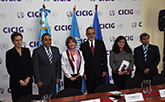 The representative of the Judiciary (OJ), Judge Mynor Custodio Franco Flores, said that as a result of the strengthening of and joint work of justice institutions, judges have the responsibility of assessing all appropriate evidence in order to issue judgements in accordance with the law.
The representative of the Judiciary (OJ), Judge Mynor Custodio Franco Flores, said that as a result of the strengthening of and joint work of justice institutions, judges have the responsibility of assessing all appropriate evidence in order to issue judgements in accordance with the law.
Oversight
In his address the Commissioner underlined the importance of different sectors of society continually auditing and participating in order to strengthen the justice system and prevent setbacks following the change in authorities later this year.
"The changes that will take place at important institutions must be constantly overseen by civil society in order to prevent any setbacks affecting the harmonious work of institutions, thereby consolidating progress and creating sustainability," he said.
He described the progress in the work of the MP, with the support of the Ministry of the Interior, to be a victory in "its commitment to tackling impunity through strong, in-depth investigations. We cannot renounce this work and under no circumstances should it be lower than the levels seen under the current Attorney General."
As to the nomination of 40 candidates for judgeships at the Supreme Electoral Tribunal, the Commissioner said the Nominating Committee had done a good job. "There are some strong candidates included on the list; therefore, we hope the Congress of the Republic fulfills it duty to select the best candidates and consider whether they have recognised honesty, which implies that should have interacted with the public through their professional experience," he said.
The Commissioner, along with the other guests, expressed his thanks to the European Union for the donation which will enable the continuation of work to strengthen the Guatemalan justice system.


